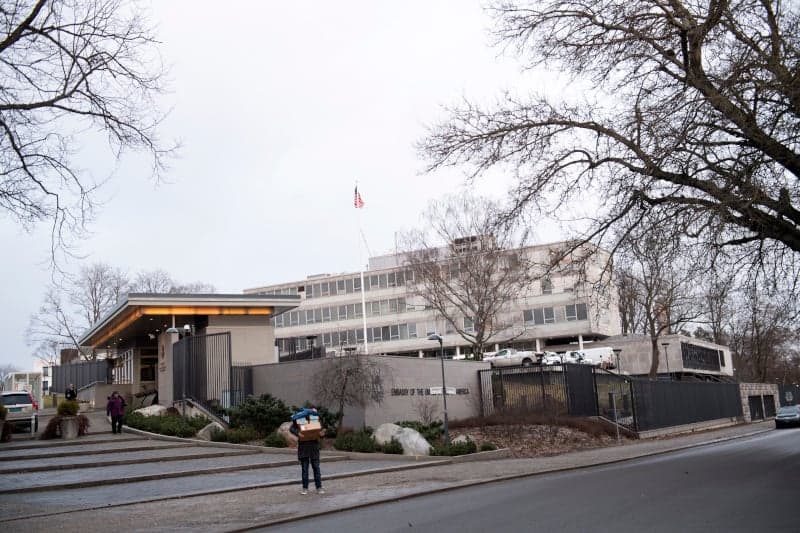Three things we know about the terror threat in Sweden

The US is warning Americans in Sweden of possible terror attacks in retaliation of recent Koran burning incidents, but the Swedish security police say their terror threat level remains unchanged. Here's a brief rundown of what we know so far.
The US is warning its citizens to keep a low profile
The warning was published in a new notice on the US embassy’s homepage.
“US citizens are advised to use caution when going to public venues frequented by large numbers of people. Gathering sites such as places of worship could be targeted. Please use caution when in, and around, all diplomatic facilities. Report suspicious activity to the relevant authorities,” reads the notice.
'Disinformation campaign against Sweden'
The warning comes after a far-right extremist last month burned the Koran outside the Turkish embassy in Stockholm, causing Turkey to suspend Nato talks with Sweden and Finland, and causing outrage and demonstrations in many Muslim countries.
Swedish authorities have previously warned that anger sparked by incidents such as the burning of the Koran, as well as the hanging of an effigy of Turkish President Recep Tayyip Erdogan by a pro-Kurdish group in January, could lead to a risk of threats.
READ ALSO:
At a press conference last week, the head of Sweden's Psychological Defence Agency said that there was an ongoing extensive disinformation campaign against Sweden, including violent statements mentioning the country as a legitimate terror target following protests such as these.
Overall terror threat level remains unchanged
The Swedish security police have not raised Sweden’s terror threat level as a result.
It is currently at three on a scale from one to five, where it has remained since 2010, with the exception of a period in 2015 when it was temporarily raised to four.
Level three is described as “elevated” which means “an attack could happen” but doesn't mean one is imminent.
A spokesperson for the security police told Swedish newspaper Aftonbladet that they were aware of the warning from the US government.
“All countries make their own threat assessments and have their own classifications. In the case of the US we refer to them. As for our assessment of the terror threat leavel, it remains at an elevated level, a three on a five-point scale,” said the spokesperson.
Comments
See Also
The US is warning its citizens to keep a low profile
The warning was published in a new notice on the US embassy’s homepage.
“US citizens are advised to use caution when going to public venues frequented by large numbers of people. Gathering sites such as places of worship could be targeted. Please use caution when in, and around, all diplomatic facilities. Report suspicious activity to the relevant authorities,” reads the notice.
'Disinformation campaign against Sweden'
The warning comes after a far-right extremist last month burned the Koran outside the Turkish embassy in Stockholm, causing Turkey to suspend Nato talks with Sweden and Finland, and causing outrage and demonstrations in many Muslim countries.
Swedish authorities have previously warned that anger sparked by incidents such as the burning of the Koran, as well as the hanging of an effigy of Turkish President Recep Tayyip Erdogan by a pro-Kurdish group in January, could lead to a risk of threats.
READ ALSO:
At a press conference last week, the head of Sweden's Psychological Defence Agency said that there was an ongoing extensive disinformation campaign against Sweden, including violent statements mentioning the country as a legitimate terror target following protests such as these.
Overall terror threat level remains unchanged
The Swedish security police have not raised Sweden’s terror threat level as a result.
It is currently at three on a scale from one to five, where it has remained since 2010, with the exception of a period in 2015 when it was temporarily raised to four.
Level three is described as “elevated” which means “an attack could happen” but doesn't mean one is imminent.
A spokesperson for the security police told Swedish newspaper Aftonbladet that they were aware of the warning from the US government.
“All countries make their own threat assessments and have their own classifications. In the case of the US we refer to them. As for our assessment of the terror threat leavel, it remains at an elevated level, a three on a five-point scale,” said the spokesperson.
Join the conversation in our comments section below. Share your own views and experience and if you have a question or suggestion for our journalists then email us at [email protected].
Please keep comments civil, constructive and on topic – and make sure to read our terms of use before getting involved.
Please log in here to leave a comment.